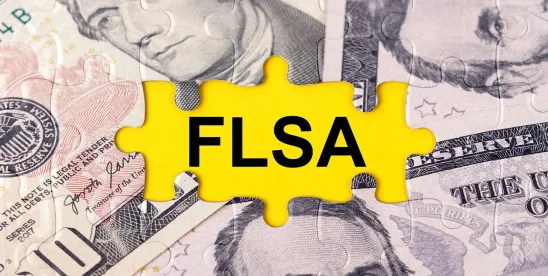The U.S. Supreme Court next term will address the standard of proof that employers must meet to show an employee is exempt from the minimum wage and overtime requirements of the Fair Labor Standards Act (FLSA). E.M.D. Sales, Inc. v. Carrera, No. 23-217.
The justices agreed to review a decision by the U.S. Court of Appeals for the Fourth Circuit. In that case, a three-member circuit panel held that employers must meet a “clear and convincing” standard to establish that an exemption applies for purposes of asserting an affirmative defense to an overtime claim. This holding is an outlier and conflicts with the majority of circuits, which have held that the lower “preponderance of evidence” standard applies.
Background
Three sales representatives for a food distribution company filed suit in a Maryland federal court, claiming that the employer failed to pay them overtime compensation due under the FLSA. The employer argued that the plaintiffs were not entitled to overtime because the FLSA’s “outside sales” exemption applied. The exemption applies to employees whose “primary duty is [ ] making sales” and who customarily work away from the employer’s place of business.
An employer has the burden of demonstrating an exemption applies if it is asserted as a defense to an FLSA suit. At trial, the parties disputed what was required of the employer to meet that burden. The plaintiffs argued the employer had to establish the exemption through “clear and convincing evidence,” pointing to Shockley v. City of Newport News, a 1993 decision by the (controlling) Fourth Circuit. (The Fourth Circuit covers federal courts in Maryland, North Carolina, South Carolina, Virginia, and West Virginia.)
The employer cited the U.S. Supreme Court’s decision in Encino Motorcars, LLC v. Navarro. In the 2018 opinion, the Supreme Court rejected the notion that exemptions should be narrowly interpreted; instead, the Court said exemptions should be given a “fair reading.” According to the employer, Encino Motorcars signaled that a less rigorous, “preponderance of the evidence” standard applied.
The trial court concluded that Encino Motorcars was not on point because it did not address the evidentiary burden head-on. Therefore, it concluded the Fourth Circuit precedent was still binding. Applying the clear and convincing standard, the court ruled the employer did not show the outside sales exemption applied to the plaintiffs and ruled in their favor. On appeal, a Fourth Circuit panel agreed. The panel held it was bound by Fourth Circuit precedent, but it said the full Fourth Circuit court should consider the proper standard to be used and whether to overturn its earlier decision. The full Fourth Circuit declined the employer’s petition for review.
Question Presented
The justices will decide “[w]hether the standard of proof that employers must satisfy to demonstrate the applicability of a Fair Labor Standards Act, 29 U.S.C. 201 et seq., exemption is a preponderance of the evidence or clear and convincing evidence.”
The Fourth Circuit’s clear and convincing standard is an outlier. The six other federal courts of appeal that have addressed this issue have ruled the preponderance of the evidence standard is the proper burden for determining whether an FLSA exemption applies. The U.S. Department of Justice, asked to submit an amicus brief, supported the petitioner’s argument that the Fourth Circuit’s decision was incorrect, stating: “In the view of the United States, the Court should summarily reverse the court of appeals’ decision.”
The Court likely will extend its Encino Motorcars decision to the evidentiary burden applicable to exemptions and align the Fourth Circuit’s standard with its sister circuits.
Potential Impact
The Supreme Court’s eventual decision in this case will have important implications for employers. The Fourth Circuit’s higher evidentiary burden makes it more likely that a factfinder will conclude an employee does not meet the asserted exemption, increasing the risk of liability under the FLSA. Currently, establishing an exemption is more difficult in some locations than in others. By resolving the circuit conflict, the decision will ensure that employers will face a uniform national standard. Additionally, while the case on the 2024-25 docket involves the outside sales exemption, the decision will clarify the proper evidentiary burden for showing that any of the FLSA’s exemptions apply.





 />i
/>i

